The Lifelong Benefits of Service Learning Abroad
Have a Positive Impact on Communities while Growing as a Global Citizen
Article by Dr. Jessie Voigts
Wandering Educator Contributing Editor for TransitionsAbroad.com
9/8/2016 with resources updated by Transitions Abroad 10/5/2023
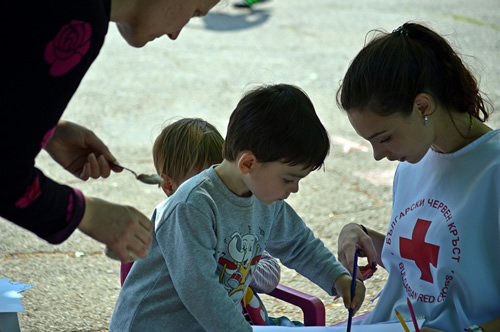 |
| Service learning abroad can take many forms, including teaching children in local communities and helping with health care. |
One of the most important parts of becoming a global citizen is understanding and caring about the people in the world. Studying abroad can be an impetus for intercultural growth, as can having a sense of curiosity and desire to learn. But as we know, nothing beats learning by doing. Experiential education is a lifelong pursuit. And one of the best ways to garner effective and impactful experiential learning is by incorporating service learning into the global curriculum, whether for teens, during a gap year, or while at a university during your study abroad experience.
IPSL (the International Partnership for Service Learning), one of the pioneers in the field, notes that service learning is “the pedagogy that links academic study with the hands-on experience of volunteer community service. It has become an international movement that offers new approaches to teaching and learning and to the civic engagement of institutions of higher education. It provides students with an education that meets the highest academic standards and delivers meaningful service that makes a difference to the well-being of societies around the world.”
Editor's Note: IPSL has now become incorporated into Westminster University in Portland and the core programs remain.
What does this mean for your study abroad or international experience? It means incorporating meaningful volunteer service with a focused learning objective. Your work is reciprocal — you become partners with the community you are serving. You create meaningful change while learning, growing, and becoming more aware of your global citizenship, working toward the public good.
What Does Service Learning Look Like?
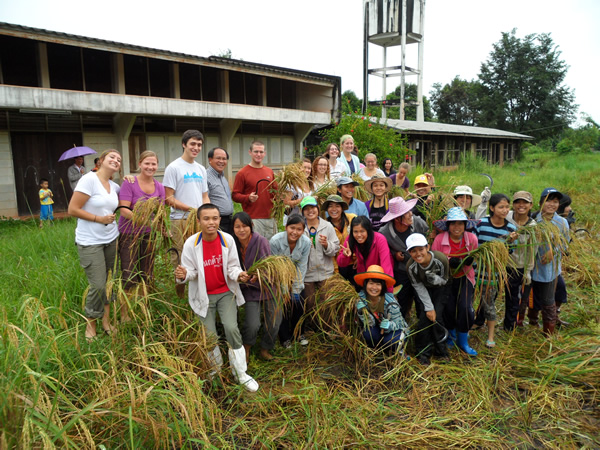 |
|
Volunteer in Thailand.
Photo courtesy of Worldteach. |
Dr. Charles Gliozzo shares the many ways students can make a difference, noting that “students involved in humanitarian assistance overseas have been invaluable in fostering cross-cultural sensitivity and in promoting social development on a community level. Student volunteers work in hospitals, clinics, schools. They are active in local government, agriculture, environmental development, business, and in many other areas.”
Service learning can take any form of activity — from science to music, health care to rebuilding a community after a natural disaster. It could be volunteering taking water samples, teaching English, analyzing data, speaking, or environmental work — there are countless ways to help others.
Courtney Peters of IES remarks that service learning “enhances academic study, assists with cultural immersion, helps develop language skills, and provides international work experience…” all good and important tools for creating a fulfilling global life — and a meaningful, interesting career.
Types of Service Learning Options
There are several types of Service Learning opportunities, ranging from formal to informal. What will best work for you?
Informal
An informal Service Learning opportunity arises when a student is passionate about helping – and learning. You might decide to add a volunteer experience after your study abroad program based on your interests. While this is the least expensive option, there is no guarantee that your experience will help the community – or yourself. Be aware that often, volunteer programs, while well-meaning, can have a negative effect on a community. Do your research, and be sure that you are volunteering responsibly.
Since there may not be direct academic supervision, work to incorporate reflection, critical thinking about your work and impact on the community, listening to locals and discussing your work with both locals and fellow volunteers. Networking is also key to a successful informal service learning project — before, during, and afterward.
Formal
Students can also incorporate service learning through study abroad or other approved academic programs. If you choose to go this way, know that you may often apply your financial aid package to a formal service learning experience.
Ask your study abroad office if there are service learning components to any of the study abroad programs they offer. If not, and you find a study abroad program you love at your university, ask the professor if they can help you add service learning to your academic experience, perhaps as an independent study, or for additional credit as part of your study abroad courses.
There are also organizations that can help with service learning additions to your study abroad programs if there aren’t any available via your campus study abroad programs. Some programs we recommend include:
TransitionsAbroad.com offers a selection of a variety of service learning programs from organizations big and small.
Benefits
Why is service learning so different from the usual study abroad, internships, and volunteering options? Because service learning offers an opportunity to be an active participant in a community, the benefits on behalf of the student increase substantially. Students also gain much from the experience regarding their futures. GVI notes that students “will come home more employable, equipped with a variety of improved soft and hard skills, and typically a more defined career path.”
Benefits include:
- Gaining an entrée into a community (perhaps for life!), by living, working, and learning alongside them.
- Making a difference in a community — via ways that they have chosen to be helped. Your work is useful in ways that the community actually needs
- Deep reflection that connects the service learning experience with broader social, development, and global issues, such as poverty, social justice, and gender equality
- A broad understanding of ethics and civic engagement gained by the first-hand experience
- Leadership experience in different cultural surroundings; adaptation to different cultural norms and mores
- Awareness of the need for a diverse set of organizational stakeholders, and learning that every voice is important
- Self-improvement and growth through community learning experiences and structured reflection
- A global understanding of international issues and how we can work together to solve them
- Practical work experience in a variety of environments and soft skill development
- Language skills
- Intercultural understanding on a deep level
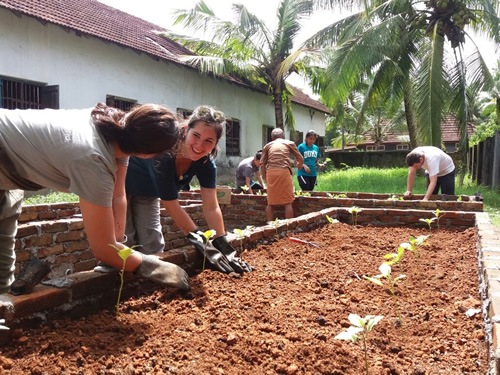 |
| Service learning participating with local communities helping with agriculture. Photo courtesy of GVI. |
The National Education Association (NEA) has made gaining Global Competence a 21st Century Imperative, and defines it as “the acquisition of in-depth knowledge and understanding of international issues, an appreciation of and ability to learn and work with people from diverse linguistic and cultural backgrounds, proficiency in a foreign language, and skills to function productively in an interdependent world community.”
Many universities are incorporating global competence into the curriculum and through study abroad offerings, but adding a service learning component enhances all of the knowledge and understanding you gain from your international experiences.
In Their Own Words
Marissa Sutera, who volunteered while a student in Zambia:
"Just two weeks in, I struggled to say goodbye to my classroom full of energetic, bubbly Zambian kids. I had grown attached to the kids, even though I was only volunteering for a short period. Studying abroad opened up my eyes to the world, but volunteering in Zambia demonstrated to me that there is more to a place and its people than meets the eye.
As with any time spent internationally, it is inevitable that you will forever have a connection with each destination, and stepping out of your comfort zone during a volunteer program will cause that connection to grow even stronger.
Of course, volunteering abroad is not for everyone, but I would highly recommend it to anyone who is looking to give back, desires to build relationships with people and communities around the world and is willing to take on additional challenges to overcome obstacles."
Josiah Ramsay Johnston, who worked on a summer student volunteer archaeological dig in Greece:
"Besides receiving a free, hands-on education in archaeological fieldwork, I came to know and love the Cretan culture I was immersed in while not in the trenches. The friendships I formed there remain fast, and the lessons I learned about the breadth of history and the variety of cultural perspective continue to inform my own perception of the world. And all I had to do was show up."
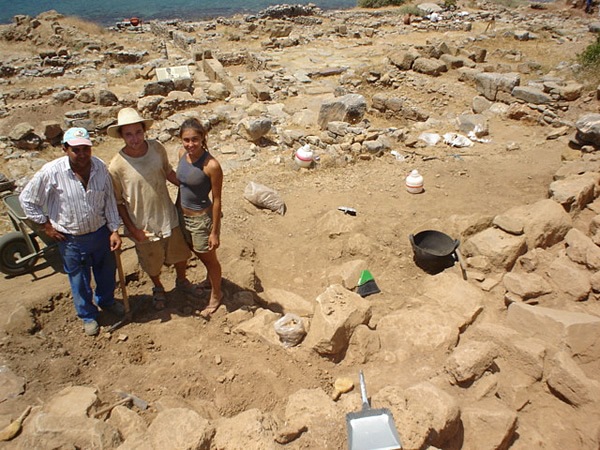 |
| During a summer volunteer archeological dig in Greece. |
Sandra Noll, who performed volunteer service with Amizade in Bolivia, wrote the following:
"Amizade arranged for me to live with a Bolivian host family and provided daily Spanish tutoring while I worked at a therapeutic and educational center for multi-handicapped children and young adults.
Initially, I wondered how I could be of service to students who are both mentally and physically challenged and whose language is Spanish. I soon learned, however, that children have a universal language. The children of CEOLI delighted in teaching me Spanish words as much as I delighted in introducing them to play dough, Uno, and bubbles. I soon found many ways to be useful in the classroom and began to feel a part of the multi-disciplinary team contributing to the students’ growth and life experience. They taught me the first “truth” of volunteer service and cultural exchange: no matter one’s country of origin, ethnicity, religion, language, physical, or mental status, people are more alike than different."
Kate Gustafson, who volunteered in the Alto Choco Cloud Forest in Ecuador, wrote:
"One of the major benefits of volunteering, of course, is the deeper, more meaningful exposure to local people, customs and issues that a work-related commitment makes possible. Along with the beautiful surroundings and the chance to meet new and interesting people, my experience was further enriched by seeing firsthand the challenges that the reserve faces. One afternoon, clambering hand over fist to the top of a steep hillside that had been slashed in preparation for slash-and-burn farming we found a local farmer and his son furiously hacking with machetes at the slender trees and vines, certain that the land belonged to them. Our volunteer coordinator, adamant that the hillside was part of the reserve, convinced them to stop slashing until she could straighten the matter out officially in the records office in Quito. As the sounds of their machetes fell silent, we looked out on a mountainside littered with felled trees and wrecked foliage. For the farmer and his son, clad in threadbare clothing, the hillside was clearly a matter of subsistence. For the reserve, it was a matter much larger but difficult to explain to hungry neighbors."
Brian Liesinger, who studied abroad and did a service learning project in Malta:
"My time with Hamza and Mustapha taught me that service does not have to feel like work and that it does not take a monumental effort. Doing my little part to help someone else gave me a sense of purpose and the feeling that, while I wasn’t changing the world, I was having a positive effect on their world. I also learned how to connect with people from a culture that was drastically different from my own. It did not feel like a service at all; I felt like the one being educated."
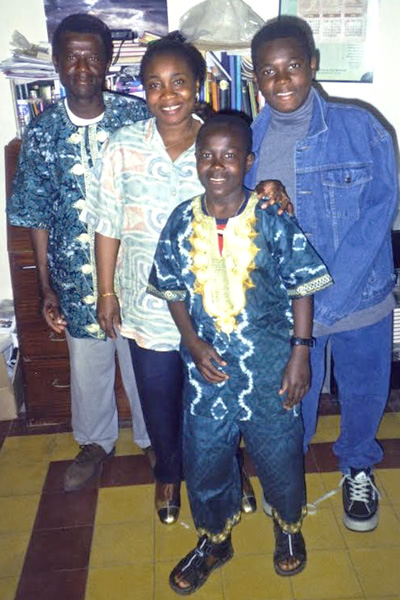 |
| The family of the two boys to whom Brian Liesinger taught English. Mustapha is in the front, and Hamza is on the far right. |
Caroline McKay, who chose an AFS study abroad program in Ghana that had a service learning component:
"While AFS has programs that concentrate on Language Learning and other areas, it was community service that interested me. There were many countries from which to choose — such as Paraguay, Russia, Bolivia, and Belgium. And while AFS has programs for high schoolers, it also offers programs for graduates, which are a great way to pursue special interests or learn what it's like to pursue a career such as education, marketing, or veterinary medicine. You can research the weather, but you cannot form expectations about what your experiences may be. Our presence clearly made a great difference to these children who had little excitement in their lives."
Lisa Hadesman, a student who volunteered along with her study abroad program in Florence, wrote:
"I was studying in Florence during my junior year, and I felt lost — not lost in a physical sense, but in the sense of not feeling part of a community. So I turned to something that I was comfortable with: volunteer work.
From I know volunteering allows you to make connections — both with the people you are helping and the people who are volunteering with you. In a foreign country volunteer work can be a particularly effective icebreaker. You can meet new people and explore sides of your temporary home that only locals know."
Top Tips
As with any endeavor, there are many ways to do your service learning. It is critical to research before you make any decisions. Become informed about what to look for, the ethics of volunteering, and finding an opportunity that helps you and your potential partner organization.
-
Understand how to evaluate international volunteer sending organizations.
-
Talk with your professors or study abroad advisors to discern opportunities that fit your skills and learning objectives.
-
Remember that service learning is about gaining understanding through working with a community on a project that benefits them.
Volunteer Abroad and Service Learning Resources
GVI provides a great overview of Service Learning for High School students and offers a brochure on Service Learning for students of all ages.
Adventures
Less Ordinary: How to Travel and Do Good is a free,
inspiring, and often brilliant new ebook edited by Ethan Gelber.
Experts and thought-leaders in volunteering discuss
responsible and creative ways to make a huge difference
in the lives of those in need worldwide.
LearningService.info offers a
book on volunteering by a team
of experienced and accomplished writers who are experts
in the field.
Tourism Concern, a British non-profit organization that works to ensure that tourism benefits local communities, provides information about the impact of volunteering as well as their recommended programs. |
Dr.
Jessie Voigts is the publisher of Wandering
Educators, a travel library for people curious
about the world. She’s published
six books about travel and intercultural learning,
with more on the way. You can usually find her family
by water — anywhere in the world.
|
